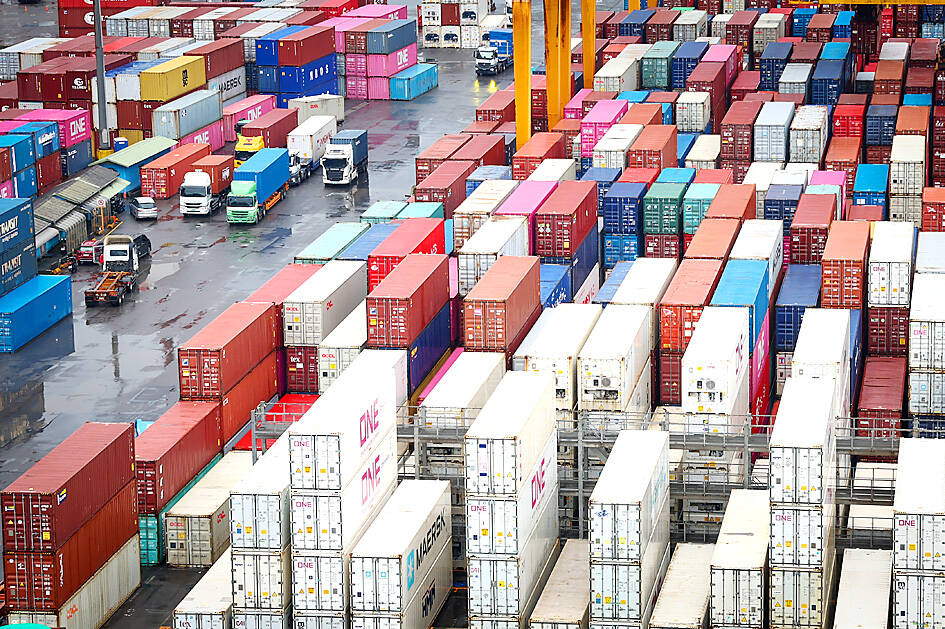The US overtaking China as Taiwan’s top export destination could boost industrial development and wage growth, given the US is a high-income economy, an economist said yesterday.
However, Taiwan still needs to diversify its export markets due to the unpredictability of US President Donald Trump’s administration, said Chiou Jiunn-rong (邱俊榮), an economics professor at National Central University.
Taiwan’s exports soared to a record US$51.74 billion last month, driven by strong demand for artificial intelligence (AI) products and continued orders, with information and communication technology (ICT) and audio/video products leading all sectors.

Photo: CNA
The US reclaimed its position as Taiwan’s top export market, accounting for 30 percent of total exports — surpassing the combined 27.2 percent share of China and Hong Kong.
Commenting on the structural shift in Taiwan’s exports, Chiou noted that Taiwan’s previous heavy dependence on China — once exceeding 40 percent of total exports — raised concerns about over-concentration in a single market and product.
However, global supply chain realignments and rising US-China tensions have led to a significant shift in Taiwan’s export structure.
Chiou explained that although Taiwan’s export focus has shifted from the Chinese market and ICT products to the US market and AI goods, it may seem like the same story is repeating, but with different implications.
First, Chiou noted that since the US is the world’s largest economy, a 30 percent export share to the country is not excessive.
Second, the US is not only the world’s most important market but also a high-income, advanced economy, he said. While both the US and China are major export markets for Taiwan, their implications differ greatly, he added.
Looking back, Chiou recalled that when Taiwan signed the Economic Cooperation Framework Agreement with China in 2010, there were concerns that closer ties would lower wages and increase unemployment. He cited concerns over the economic theory of "factor price equalization," which suggests free trade equalizes wages and rents between countries.
In contrast, Chiou said deepening trade ties with the US could drive industrial development and wage growth in Taiwan. Closer access to end markets would help shift Taiwanese industries toward higher value-added segments, he added.
However, Chiou warned that to mitigate risks from Trump’s erratic policies, Taiwan should pursue greater export market diversification.
Gordon Sun (孫明德), director of the Economic Forecasting Center at the Taiwan Institute of Economic Research, said AI servers sold mainly to the US helped push America past China as Taiwan’s largest export market.
However, Sun said this structural shift in exports is largely driven by a single product category, and whether the trend will continue remains uncertain.

In Italy’s storied gold-making hubs, jewelers are reworking their designs to trim gold content as they race to blunt the effect of record prices and appeal to shoppers watching their budgets. Gold prices hit a record high on Thursday, surging near US$5,600 an ounce, more than double a year ago as geopolitical concerns and jitters over trade pushed investors toward the safe-haven asset. The rally is putting undue pressure on small artisans as they face mounting demands from customers, including international brands, to produce cheaper items, from signature pieces to wedding rings, according to interviews with four independent jewelers in Italy’s main

Japanese Prime Minister Sanae Takaichi has talked up the benefits of a weaker yen in a campaign speech, adopting a tone at odds with her finance ministry, which has refused to rule out any options to counter excessive foreign exchange volatility. Takaichi later softened her stance, saying she did not have a preference for the yen’s direction. “People say the weak yen is bad right now, but for export industries, it’s a major opportunity,” Takaichi said on Saturday at a rally for Liberal Democratic Party candidate Daishiro Yamagiwa in Kanagawa Prefecture ahead of a snap election on Sunday. “Whether it’s selling food or

CONCERNS: Tech companies investing in AI businesses that purchase their products have raised questions among investors that they are artificially propping up demand Nvidia Corp chief executive officer Jensen Huang (黃仁勳) on Saturday said that the company would be participating in OpenAI’s latest funding round, describing it as potentially “the largest investment we’ve ever made.” “We will invest a great deal of money,” Huang told reporters while visiting Taipei. “I believe in OpenAI. The work that they do is incredible. They’re one of the most consequential companies of our time.” Huang did not say exactly how much Nvidia might contribute, but described the investment as “huge.” “Let Sam announce how much he’s going to raise — it’s for him to decide,” Huang said, referring to OpenAI

The global server market is expected to grow 12.8 percent annually this year, with artificial intelligence (AI) servers projected to account for 16.5 percent, driven by continued investment in AI infrastructure by major cloud service providers (CSPs), market researcher TrendForce Corp (集邦科技) said yesterday. Global AI server shipments this year are expected to increase 28 percent year-on-year to more than 2.7 million units, driven by sustained demand from CSPs and government sovereign cloud projects, TrendForce analyst Frank Kung (龔明德) told the Taipei Times. Demand for GPU-based AI servers, including Nvidia Corp’s GB and Vera Rubin rack systems, is expected to remain high,